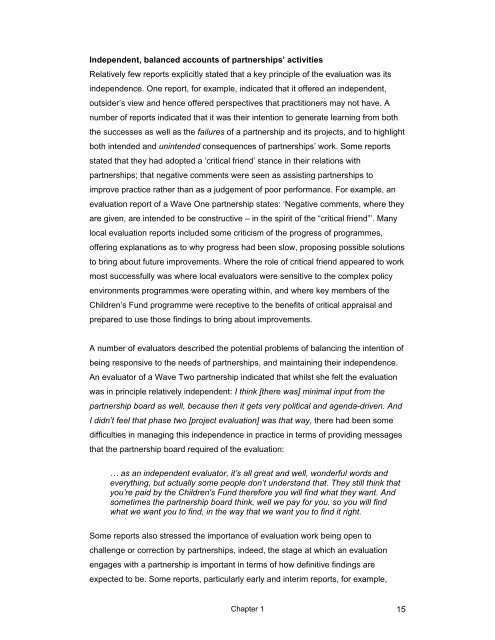Local Evaluation of Children's Services Learning from the Children's ...
Local Evaluation of Children's Services Learning from the Children's ...
Local Evaluation of Children's Services Learning from the Children's ...
- No tags were found...
Create successful ePaper yourself
Turn your PDF publications into a flip-book with our unique Google optimized e-Paper software.
Independent, balanced accounts <strong>of</strong> partnerships’ activitiesRelatively few reports explicitly stated that a key principle <strong>of</strong> <strong>the</strong> evaluation was itsindependence. One report, for example, indicated that it <strong>of</strong>fered an independent,outsider’s view and hence <strong>of</strong>fered perspectives that practitioners may not have. Anumber <strong>of</strong> reports indicated that it was <strong>the</strong>ir intention to generate learning <strong>from</strong> both<strong>the</strong> successes as well as <strong>the</strong> failures <strong>of</strong> a partnership and its projects, and to highlightboth intended and unintended consequences <strong>of</strong> partnerships’ work. Some reportsstated that <strong>the</strong>y had adopted a ‘critical friend’ stance in <strong>the</strong>ir relations withpartnerships; that negative comments were seen as assisting partnerships toimprove practice ra<strong>the</strong>r than as a judgement <strong>of</strong> poor performance. For example, anevaluation report <strong>of</strong> a Wave One partnership states: ‘Negative comments, where <strong>the</strong>yare given, are intended to be constructive – in <strong>the</strong> spirit <strong>of</strong> <strong>the</strong> “critical friend”’. Manylocal evaluation reports included some criticism <strong>of</strong> <strong>the</strong> progress <strong>of</strong> programmes,<strong>of</strong>fering explanations as to why progress had been slow, proposing possible solutionsto bring about future improvements. Where <strong>the</strong> role <strong>of</strong> critical friend appeared to workmost successfully was where local evaluators were sensitive to <strong>the</strong> complex policyenvironments programmes were operating within, and where key members <strong>of</strong> <strong>the</strong>Children’s Fund programme were receptive to <strong>the</strong> benefits <strong>of</strong> critical appraisal andprepared to use those findings to bring about improvements.A number <strong>of</strong> evaluators described <strong>the</strong> potential problems <strong>of</strong> balancing <strong>the</strong> intention <strong>of</strong>being responsive to <strong>the</strong> needs <strong>of</strong> partnerships, and maintaining <strong>the</strong>ir independence.An evaluator <strong>of</strong> a Wave Two partnership indicated that whilst she felt <strong>the</strong> evaluationwas in principle relatively independent: I think [<strong>the</strong>re was] minimal input <strong>from</strong> <strong>the</strong>partnership board as well, because <strong>the</strong>n it gets very political and agenda-driven. AndI didn’t feel that phase two [project evaluation] was that way, <strong>the</strong>re had been somedifficulties in managing this independence in practice in terms <strong>of</strong> providing messagesthat <strong>the</strong> partnership board required <strong>of</strong> <strong>the</strong> evaluation:… as an independent evaluator, it’s all great and well, wonderful words andeverything, but actually some people don’t understand that. They still think thatyou’re paid by <strong>the</strong> <strong>Children's</strong> Fund <strong>the</strong>refore you will find what <strong>the</strong>y want. Andsometimes <strong>the</strong> partnership board think, well we pay for you, so you will findwhat we want you to find, in <strong>the</strong> way that we want you to find it right.Some reports also stressed <strong>the</strong> importance <strong>of</strong> evaluation work being open tochallenge or correction by partnerships, indeed, <strong>the</strong> stage at which an evaluationengages with a partnership is important in terms <strong>of</strong> how definitive findings areexpected to be. Some reports, particularly early and interim reports, for example,Chapter 1 15
















